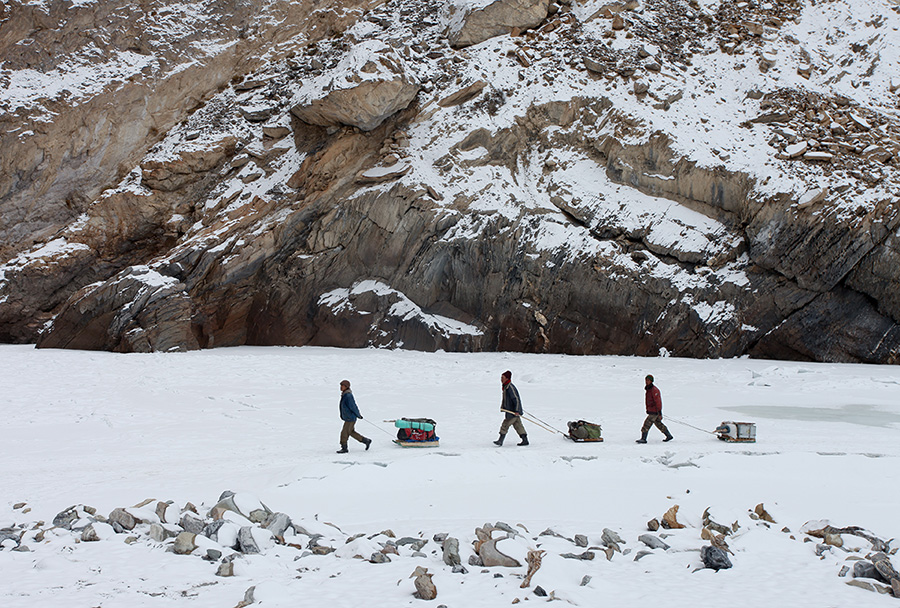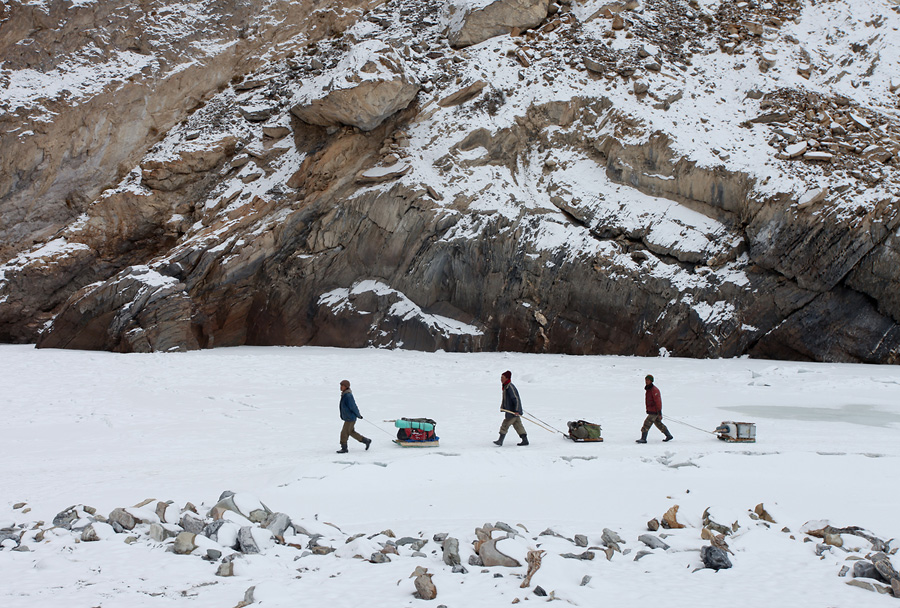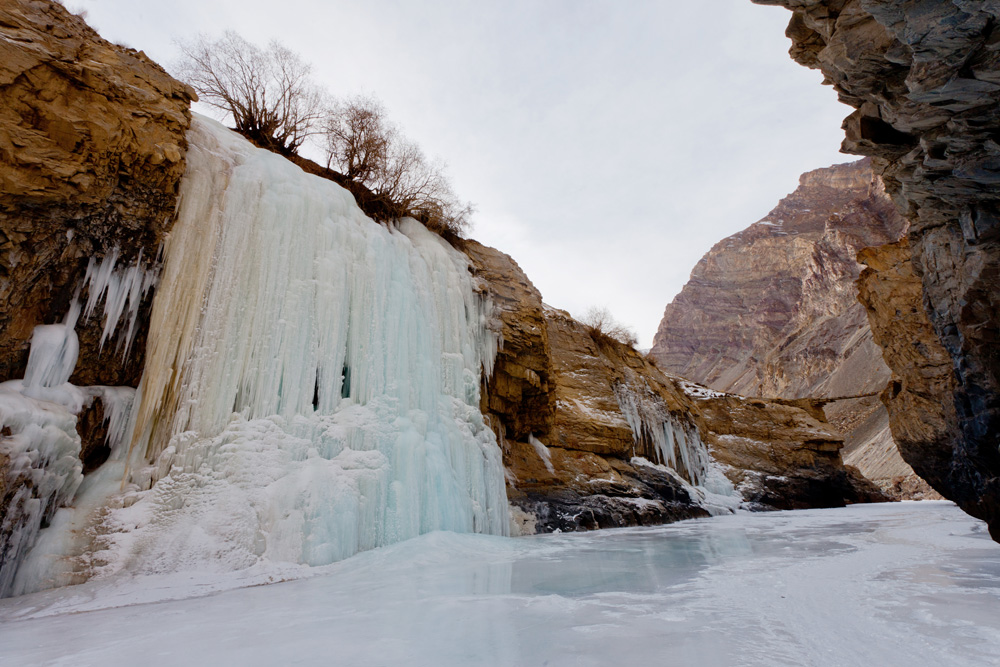Image below, of porters drag sledges on a frozen Zanskar River, facilitating us on ‘Chadar Trek’.

It was about seven years ago that I walked on the now well-known Chadar Trek–a fascinating walk on the ice-sheets of Zanskar in winter months. We walked for nearly two weeks, crossing over from Indus Valley to the habitations in Zanskar region. We walked over thick and thin ice and sometimes had to face climbing challenges where the ice-surface was completely broken.
In the year that we were there, we noticed no more than a handful of trekkers along the path and occasional Zanskar-locals trying to get to Leh on the ice-road. It was a near-empty path on the ice.
The recent years, I have been told, have seen an explosion of people trying to get on Chadar. It has come with its share of environmental consequences, such as porters cutting away the last of the trees for firewood and too much human activity degrading the ice surface. Some travellers have complained about accumulating trash and human waste. The narrow river gorge has very little plain spaces in its banks and trekkers have even had difficulties finding ground to pitch tents in the crowded camping locations.
Looking back at all this and my own journey across the ice-river, it is obvious that I have been one of the contributors to the transformation of a region of astounding beauty into just-another-place that contributed to human need for entertainment. Being one of the early visitors to the area and having written about it and talked about it many forums, I have perhaps had my contributions to popularizing the region as well (you can see several stories by searching within this blog).
This brings me to a larger question, where I only have questions at the moment without any answers. How do we make our insatiable desire to be everywhere a sustainable one that leaves no damaging footprints? The work is on; I am, as lot of travellers are, increasingly looking forward to making our journeys environment conscious, and hoping to taking more concrete steps in the direction with progress in time.

Image: Porters carrying trekker’s baggage on sledges on frozen Zanskar River during Chadar Trek
‘Chadar Trek’ is a now popular winter walk on the frozen Zanskar River.
Flowing at an altitude above 10,000 feet through Zanskar and Ladakh regions, the river freezes over every winter, in the months of January and February (See my trek-log on Chadar Trek, published in Trino magazine).
During these months, the high passes up in the mountains are buried in snow. Roads and paths in and out of Zanskar are shut until summer. For more than a millennium, people of Zanskar Valley have used the frozen river to access outside world during winter.
In those days, they walked out of necessity, to sell butter and buy essentials for their homes. Even today, people of Zanskar continue to use the frozen river as a necessity. Now, it is largely to send their children to schools in Ladakh or in the plains below after winter vacations.
In the past few years, this walk on the frozen river has attracted visitors from the plains who want to experience the journey on snow. This has been popularly known as ‘Chadar Trek’.
The length of this walk has reduced considerably over the years, thanks to a road being built by venerable Border Roads Organization along the river valley. Yet, speculations exist on the feasibility of completing the road in parts of the steep and rocky Zanskar Valley.
In the year 2011, I made a fifteen day walk on the river, travelling all the way to Zangla Village in Zanskar and back to Ladakh. Most trekkers only do a smaller sample of this, walking for no more than four to five days.
In the first day or two of being there in Ladakh, the winter temperatures seemed unbearably cold. But our bodies adjusted quickly. In a few days, we weren’t suffering much, although we were never fully comfortable until the last few days. After ten days on the trek, we managed to shed many layers of clothing during brisk walks.
The real heroes of Chadar Trek are the porters, usually hardy people from Zanskar who enable this journey for outsiders. They carry heavy baggages, often on home-made sledges. But at times when the ice-sheet is not at its best, they will have to lift the whole assembly on their back. In places where the ice is broken, it’s sometimes scary to see them dart across steep the mountain slopes with those sledges on their back, often balancing on a thin ledge. In other situations, when the ice sheet is broken and there is no choice but to wade the freezing flow of the river, they even carry travellers on their back and get them to the other side dry and safe. Of course, they don’t care much about getting their own legs down into the bitterly cold flow.
There are other challenges in Chadar that are beyond the difficulties of getting past the broken ice-sheets. The journey poses environmental issues. Most groups, though not all, carry kerosene for cooking and warmth and refrain from burning wood. But the porters, who often number two for one trekker, do not carry kerosene and rely on wood instead. As the number of visitors has increased over the last few years, wood is getting harder to find.
Ladakh-Zanskar is already a cold desert where trees are not easy to find. Yet, the porters say that junipers weren’t hard to find very close to the river and campsites until about a decade ago. Now, with fast consumption, they are forced to walk more than an hour every evening to cut wood needed for their cooking and to stay warm overnight.
Another significant problem with increasing crowds is in managing human waste and garbage. I have been told (from not completely reliable sources) that in the past few years, the problem of waste has grown manifold.
In 2011, when I was there, I could see these problem already existing, although it appeared to be manageable. Some immediate changes were necessary in the way Chadar Trek happened. It seemed important that the porters switch to kerosene instead of using wood (and of course, trekkers pay for the expense). A garbage disposal policy was essential too, to bring back all the waste and not leave anything behind.
In the subsequent years, I was invited to redo the Chadar but decided not to go. I thought one experience was enough, and then it always pricked a bit that the trek wasn’t exactly eco-friendly.
But things got worse in the subsequent years. Until about 2011, the total number of trekkers probably numbered in a hundred or two in the entire season, no more. But things changed suddenly in 2012 (if I remember right) when Indiahikes–a company specializing in Himalayan Treks and known for its strategy of taking huge batches at low prices–started offering Chadar Trek to its clients. The number of travellers suddenly exploded. The trek prices also plummeted, suddenly dropping by as much as 60% from the previous year’s going rates.
This also led to conflicts and more trouble. The local association of tourism professionals (ALTOA – All Ladakh Tour Operators Association) entered into a dispute with the company. The battle was fought on the grounds of environmental damage that comes with large footfalls, both parties accusing each other in some way.
Between all this action, people of Zanskar continued to ply on Chadar causing least damage to the environment. Unlike the trekkers who need a lot of local assistance to live through the trip, the Zanskari travellers are very capable and move across Chadar without any support. They also take no more than two days to complete the walk, stopping over just for a night on the way. They also travel with minimum supplies and ably handle the cold weather without much fuss; impossible for an outsider.
The Jan-Feb months of 2015 was a dampener for Chadar Trek, hopefully allowing a breather for the valley to recuperate. A huge landslide has formed a glacial lake somewhere upstream Zanskar River (now cleared by the army). Knowing that this can burst anytime and flood places downstream, the district administration has banned Chadar Trek as a measure of precaution. The same district administration should also enforce environment friendly measures for the trek in the coming years.


